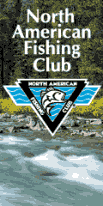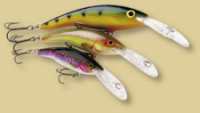
Free 90 day Risk free trial offer click
here





















|
Road Trip for Southern 'Eyes
By Sam Anderson
Winter has arrived. Some places in my home state have as much snow on
the ground now, as they do during the March blizzards. My Ranger 620
is
tucked away in the garage and all the equipment is ready to roll. All
I have to do is hook it up to my Chevy pick-up and I can start a road trip
for some southern 'eyes.
How far south, you might ask? Well if you could draw a imaginary line
through Little Rock, Nashville and Atlanta you could pretty much define
the southern limit of the walleye range. But is seems that those lakes
lying closest to that boundary are the ones that produce the biggest fish.
Many fishermen heading south will probably fish deep water for walleyes
and that can be a big mistake. Most of the walleyes in these southern lakes
are shallow. Any short, hard bottom point may hold walleyes on a given
day. But reservoirs or lakes have hundreds of short, hard bottom points.
You are better off passing up the short points and stopping when you find
a long point with several kinds of fish attracting features. A good point
might have a stair step ledge on one side, scattered rock on top and a
shale bed lining the other side. The point's shallow inside turn may be
soft bottomed, while the deeper outside turn might break off
into another smaller, hard bottom point. Such an area is almost certain
to hold walleyes.The same principle applies to sunken islands; many
points, stair step ledges, and a variety of bottom conditions are generally
better than a
smooth, gradually breaking sand hump. I might also mention that an
already good island is made all the better by the presence of a saddle.
This saddle is a dip between two higher spots of land. If this saddle area
is connected to a prospective point all the better, because it is a fish
magnet.
Don't forget to check out some other productive areas such as roadbeds,
riprap, creek channels, stump fields, or isolated rock piles, bars
and rockslides.
One type of structure that is over looked by many anglers is floating
structure. Oh sure there is the buoy and maybe a swimming platform
that
fish are attracted to, but more specifically there are mud lines. Mud
lines can be formed when the wind comes up on those warm days or they may
be formed as another stream or river flows into an existing one. The confluence
of the two rivers meeting will also form a mud line.All mud lines are not
created equal at least in terms of angling potential. An angler should
look for secondary structure contained in the mud line such as vegetation,
boulders, and submerged brush. This secondary will hold baitfish
and eventually the larger fish will follow the mud line until it
provides food or an advantageous ambush point.
Mud lines are a great structure to fish in because the angler can fish
them quickly. If you fish an area and you don't have a fish within 10 to
15 minutes move on to another location. My father, who loved to troll,
would work over a mud line and if nothing was active he would be on to
another spot. Lure selection in the form of crankbaits should appeal to
the fish senses. They should be big lures that displace water and
give off vibration, or rattle and they should be flashy with bright
metallic finishes. A great choice here would be the Storm Thunderstick.
It has all the ingredients for fishing mud lines, color, flash and
vibration.
 Rapala
Taildancer
Rapala
Taildancer |
Also, the Rapala Tail Dancer, that has all the qualities of the Husky
Jerk and the Shad Rap.If you are looking for trophy walleye fishing, then
Greers Ferry in
Arkansas is the place to be.Early in the winter concentrate your fishing
at the mouth of feeder creeks, especially in the early evening hours |
Troll your #7 and #9 Shad Raps parallel to the deltas formed by these
creeks.
To slow down your lure presentation use a little jig tipped with a
minnow. But don't get stuck in a slow pattern. Utilize extremes. Rip the
jig back to the boat on one retrieve, and then work the jig slow,
bouncing it along the bottom on the next retrieve.

Lindy's
Fuzzy Grubs |
My favorite jig in
this situation is a 1/4 ounce Fuzzy Grub jig tipped with a minnow. |
I prefer the Fuzzy Grub because it is round and I can easily attach a stinger
hook to the minnow and up my chances of catching a finicky walleye. When
in doubt if you have contact with the bottom, increase the size of your
jig and minnow. You might get hung up more, but you might also have
a wallhanger on your hands. There are literally dozens of healthy walleye
fisheries in the large
flood-control and hydro-electrical lakes of the South. Such lakes are
Cumberland Lake in Kentucky; Stockton, Truman and Lake of the Ozarks
in
Missouri; Greers Ferry, Bull Shoals and Norfork in Arkansas. I can
probably go on and on about all the favorite southern lakes, or rivers.
Remember, they don't bite until you get there. Just spend time on
or near the water. The more you practice and spend time in the great
outdoors with your friends and families the happier and more relaxed you
will become. When planning for that dream vacation include all the
members of the family. Time spent with your kids and spouse will be as
memorable as an exploding bass hitting a top water plug, or the soft
pull of the walleye as the sun sets on another southern lake. If you would
like to drop me a line and tell me about your favorite southern hot spot
contact me on the web at www.samanderson.com.

Fish
Clix Banner Exchange
Walleyes Inc. website is maintained
by Randy
Tyler Fishing the In-Fisherman Professional Walleye Circuit, Masters
Walleye Circuit and the Team Walleye Circuit. All rights reserved.Copyright
1999/2001
Please visit these site sponsors
Daiichi/Tru-Turn Hooks,
Lindy
Little Joe, R-A.M Mounting Systems,
Ranger
boats,
Mercury Marine, Bedford
Sales , Hamby's Beaching Bumpers,
Goldeneye
Marine products, Panther
Marine Products, Webfoots body
sock, Bait Rigs Tackle
|



